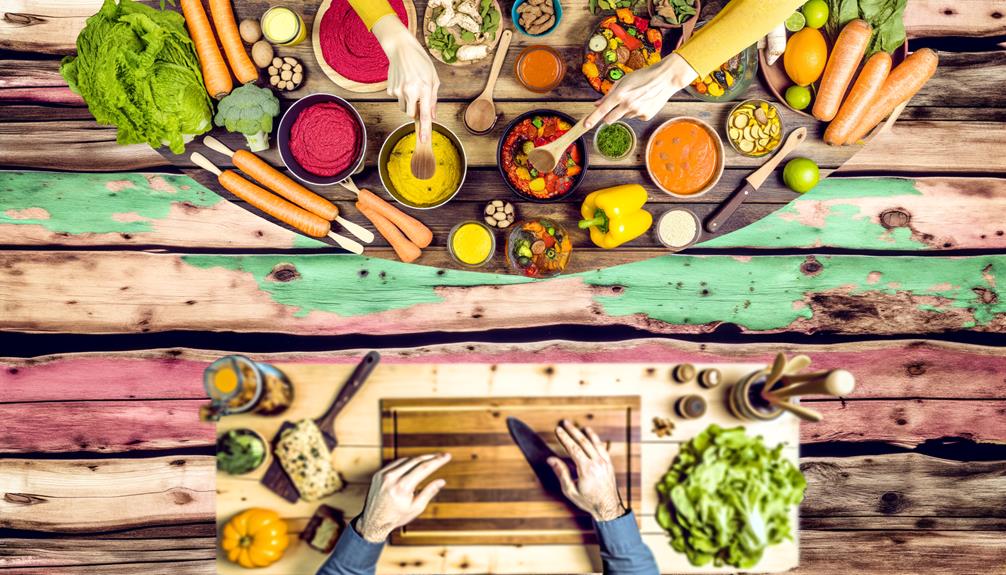As you venture into the realm of veganism, it’s not just about changing your diet, but also influencing the perceptions of those around you. You’re not only learning how to substitute tofu for chicken or how to make a hearty meal from just plants, but you’re also discovering how to navigate social gatherings, handle unsupportive friends and family, and communicate your ethical choices effectively. It’s about bridging the gap between your new lifestyle and the traditional, often misunderstood, views on veganism. So, how do you approach these conversations? How do you showcase the beauty, simplicity, and compassion inherent in a plant-based lifestyle? Let’s explore these questions together, and in doing so, learn how to inspire a more compassionate, health-conscious world.
Key Takeaways
- Importance of maintaining nutritional balance in a vegan diet
- Strategies for managing social events as a vegan, such as communicating dietary needs and seeking out vegan-friendly options
- Understanding and managing cravings and diet changes through exploring vegan alternatives and seeking support from online communities
- Communicating the vegan philosophy by emphasizing animal welfare, environmental conservation, and personal health while maintaining a compassionate and plant-focused narrative
Understanding Nutritional Balance
As you embark on your vegan journey, grasping the importance of nutritional balance, particularly the balance of carbs, proteins, and fats, is crucial to thriving on a plant-based diet. Understanding nutritional balance is not just about going vegan; it’s about becoming a healthy vegan.
Transitioning to a vegan lifestyle requires you to look beyond eliminating animal products. You’re invited to delve deeper into the world of plant-based foods, understanding their nutritional content, and learning how to combine them to meet your nutritional needs.
You’ll discover numerous plant-based protein sources that can help replace the protein typically obtained from animal products. Lentils, chickpeas, quinoa, tofu, and tempeh are just a few examples. They are not only rich in protein but also packed with other essential nutrients.
Becoming vegan also means embracing a rainbow of colorful fruits and vegetables, each adding different nutrients to your vegan diet. It’s about getting enough nutrients, not just cutting out meat and dairy.
Handling Social Events as a Vegan
Navigating through social events as a vegan, you’ll find it’s essential to communicate your dietary needs upfront and be proactive in ensuring there are suitable food options for you. Take the initiative to inform your family and friends about your vegan transition, so they can understand and respect your choice.
Offer to bring vegan meals to gatherings. This way, you not only guarantee yourself something to eat, but also introduce others to the delicious range of vegan alternatives. It can be an enlightening experience for those unfamiliar with vegan meals, and who knows, you might inspire someone to go vegan!
Whether it’s a new vegan-friendly restaurant in town or a social event focused on plant-based eating, seek out opportunities to enjoy socializing without compromising your values. This can also be a way to connect with others on a similar journey.
Lastly, remember to be patient with yourself and others. Your transition to veganism is a personal journey, and handling social events as a vegan can be challenging at first. But with time, you’ll find your rhythm and become adept at navigating these situations while continuing to serve others with compassion and respect.
Managing Cravings and Diet Changes
While mastering the art of social events can be a challenge, a significant hurdle you might face on your vegan journey is managing cravings and adjusting to dietary changes. As you transition to a vegan lifestyle, it’s normal to crave non-vegan foods. Don’t worry, there are plenty of delicious vegan alternatives to satisfy your cravings.
Let’s look at a simple table to help you navigate diet changes:
| Craving | Non-Vegan Food | Vegan Alternative |
|---|---|---|
| Cheese | Cow’s cheese | Cashew or almond cheeses |
| Meat | Steak, chicken, fish | Legumes, tofu, tempeh |
| Dessert | Dairy-based ice cream | Coconut or almond milk ice cream |
Exploration is key. Try out various vegan recipes and find your favourites. Remember, a balanced vegan meal is essential for healthy eating. Use online resources to make sure you’re getting all essential nutrients.
Becoming vegan means more than just changing your diet; it’s a lifestyle change that promotes compassion and sustainability. Stay connected with online vegan communities for support during cravings and diet changes. They can offer advice and inspiration to make your transition smoother.
Communicating the Vegan Philosophy
To effectively share your vegan journey with others, it’s crucial to understand and articulate the core principles and philosophy of veganism. Jack Norris, in his book “Vegan for Life”, underlines the importance of communicating the vegan philosophy well, particularly for new vegans.
Being vegan isn’t just about diet, it’s about embracing a lifestyle for ethical reasons, including animal welfare, environmental conservation, and personal health. As you transition, share your insights on social media or with a vegan friend, focusing on how veganism impacts animal lives, the planet, and your own wellbeing.
When discussing your vegan journey, maintain a compassionate, culturally-informed, and plant-focused narrative. Encourage open-minded discussions about the ethical reasons behind your decision. Emphasize the role of compassion, mindfulness, and sustainability in the vegan philosophy.
Identifying Unsupportive Friends and Coping Strategies
Facing the challenge of unsupportive friends during your vegan transition might feel overwhelming, but acknowledging their dismissive attitudes or mocking comments becomes the first step in setting healthy boundaries. It’s crucial to identify these friends and learn how to navigate potential social pitfalls.
When dealing with dismissive comments about your vegan burgers or veggie dishes at a gathering, find solace in your vegan blog or cooking classes. They’ll provide you with fresh culinary inspiration and the confidence to stand by your choices. Also, seeking support from like-minded individuals, either in person or via online communities, can help you feel less isolated.
Checking your health status through regular blood tests is an excellent coping strategy. It not only assures you of your health but can also serve as an effective rebuttal to those who question your diet’s nutritional adequacy.
Engage with YouTube videos on effective communication techniques to express your feelings. Being able to calmly discuss your vegan transition with friends and family can help mitigate their unsupportive behavior. Remember, this journey is about your growth and well-being, so prioritize self-care and surround yourself with positive influences.
Frequently Asked Questions
How Do You Teach People About Veganism?
You’d dispel vegan misconceptions, explain ethical reasons, environmental impact, health benefits, and animal rights. Teach veganism basics, navigate skepticism, suggest recipes, discuss vegan challenges, and cultural adaptation. It’s about sharing knowledge compassionately and encouraging a plant-focused lifestyle.
What Is the Best Way to Transition to a Vegan Diet?
You’ll need to master meal planning, ingredient swapping, and identifying vegan protein. Read food labels carefully, understand vegan supplements, and balance your nutrients. Handle cravings, adapt to eating out, and learn plant-based recipes. Happy grocery shopping!
How Do I Transition My Family to Vegan?
You should involve them in meal planning, introduce vegan-friendly snacks, provide dietary advice, suggest vegan product swaps, handle resistance delicately, prioritize kids’ nutrition, prep meals, and educate about veganism benefits and recipe adaptations.
What to Know When Switching to Vegan?
You’re exploring veganism, so debunk vegan misconceptions, understand health benefits, find nutrient sources and vegan substitutes. Grasp ethical considerations, environmental impact, plan meals, shop wisely, explore vegan cuisine, and prepare for challenges. It’s a journey worth taking.







